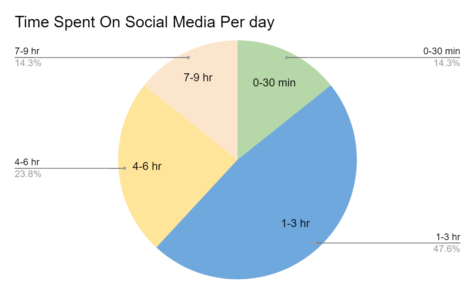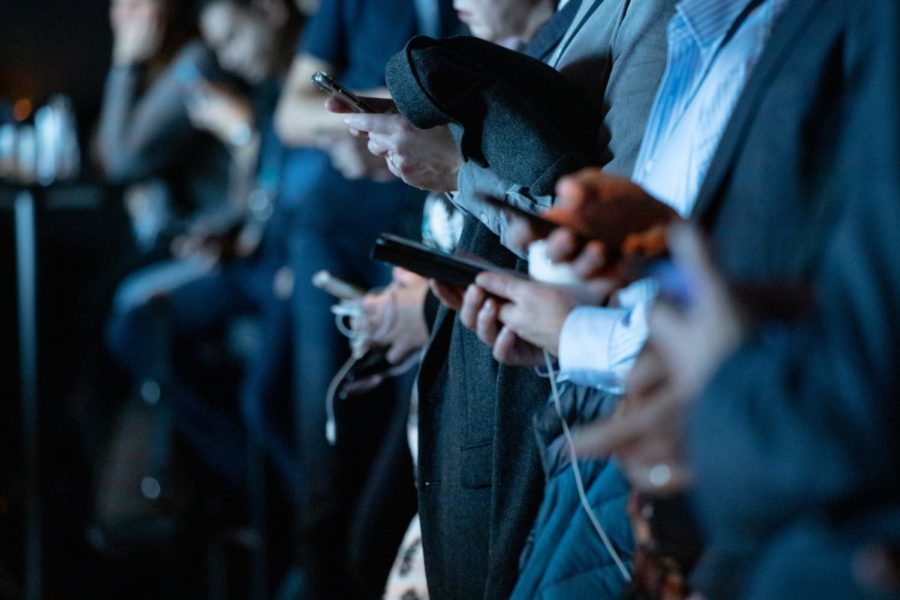Social Media Does Not Equal Relaxation
Social media has become a form of daily necessity for many, and it’s becoming more difficult to control how much time we spend on social media.
In the 21st century a huge portion of our attention span is occupied by social media. Social media dominates almost every aspect of our daily life, making it harder for us to stay off of the various platforms.
With college applications, the recent spread of yet another COVID-19 variant (Omicron), and the anxiety surrounding the pandemic and the war in Ukraine, the start of 2022 is far from what we hoped it would be. With all the chaos in the world right now, it is important to prioritize our mental health and give ourselves a break!
Although it might seem that taking a break is very simple, in reality, it is a difficult task for many of us. The main hindrance is understanding what taking a break really means — especially in this virtual day and age.
Our generation considers social media as a means of taking a break. When we are stressed, we spend hours switching from one social media platform to another. But social media does not help us relax. Rather, it is the source of our stress.
“Social media sets unrealistic standards for people,” said Mariama Thiam ’24. “It’s very distracting and at the same time very addictive, making you unable to stop scrolling.”
Studies have shown that spending too much time on social media can lead to a social media addiction, which can heighten anxiety and depression levels in users. It further affects our quality of sleep which can result in low performance at school. Although it may seem natural to use social media as a form of escape, it only keeps adding to our stress.
“There’s all this information flying at you all at once, and it’s like the world is screaming at you to be perfect,” said Naomi Liu ’22.
In a study conducted in 2017 in the Journal of Adolescence, it was found that the number of social media accounts that an adolescent has is correlated with stress, anxiety, inattention, and loneliness levels. Those with the most social media accounts are more likely to suffer from anxiety and from depressive symptoms.

So what steps can Bronx Science students take to limit their time on social media?
While it is easy to inform yourself by reading research studies and statistical facts about the harmful side of social media, the actual practice of using social media moderately is much more difficult. The most important factor for this journey is to master the willpower to change.
If you have an Apple device or an Android, you can set a time limit for individual apps.
“I usually set a thirty minute timer on Twitter because there are a lot of political issues discussed on it. People often argue on Twitter, so it’s very chaotic,” said Naushin Sakirah’22.
Another great way to stay off social media is to turn off notifications or to completely silence your phone.
Research has shown that notifications serve as a physiological trigger. In his famous classical conditioning experiment, Ivan Pavlov had trained his dog to associate the sound of a bell with getting food. In a similar fashion, beeps, buzzes, rings, flags, and pings blasting from our phones stimulate a similar response in humans. Every time we hear these sounds we are conditioned to check our phones.
Handing your devices to someone you trust at home and letting them hold onto it is another good method. This way, even if you are tempted to check your phone, you cannot physically access it. Furthermore, placing devices outside of your view distracts you from thinking about your phone. As the saying goes, “out of sight, out of mind.” Temporarily deleting social media apps is also a good solution. Since the medium is no longer present, you will have an easier time staying off of your phone.
Although these methods are useful, the best way to combat social media addiction is to replace it with positive habits. Mediation is a great way to give yourself a break, as it gives you a sense of calm and balance that benefits both your emotional and physical health. It is also an incredible stress reliever and a mindfulness practice. Similar methods include writing, creating art, and doing yoga.
“Recently I started to write in a gratitude journal. I didn’t know what that was at first, but I learned and began to do it because of my post-AP Psychology class with Ms. Bales, and it has helped a lot,” said Sadia Ali ’22, making a connection between bullet journaling and meditation.
Regular exercise and taking short walks are also good sources of relieving stress. You can also try to pick up a new hobby. Hobbies are a good way to occupy your time and also good for your mental health.
Bronx Science students, be attentive to how much time you spend on social media and give yourselves the break you deserve!
“Social media sets unrealistic standards for people,” said Mariama Thiam ’24. “It’s very distracting and at the same time very addictive, making you unable to stop scrolling.”
Tasnim Tamanna is a Staff Reporter for 'The Science Survey.' Tasnim finds journalism to be appealing because she loves to tell stories through her articles....











